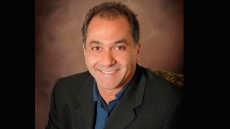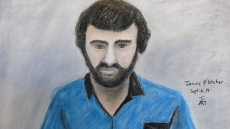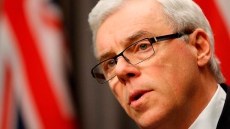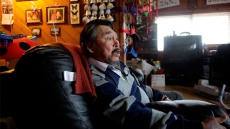OTTAWA — Getting Canada's Aboriginal Peoples, the provinces and territories and the federal government to gather together in the same room is no small feat.
But familiar sticking points are sure to return during this week's roundtable meeting on the issue of murdered and missing aboriginal women — particularly when it comes to deciding who will pay for and administer the parts of a plan to end the violence.
That could result in some "challenging discussions" among the groups when they gather Friday in the ballroom of a downtown Ottawa hotel, Assembly of First Nations national chief Perry Bellegarde said Wednesday.
"It'll be the jurisdictional piece — who's paying from the feds and the provinces, who's responsible, you know, in terms of financial investments, that's going to be an issue and ongoing, where the resources are coming from," Bellegarde said in an interview.
"The who, what, when and why, when it comes to the administration of it."
Both Bellegarde and Northwest Territories Premier Bob McLeod, who is chairing the meeting, say most of the details of the plan have already been worked out and Friday's meeting will mostly be about putting on the finishing touches.
But there are still big question marks — including who pays for what.
"We haven't gotten to that detail," McLeod said.
The roundtable will bring together families of missing and murdered aboriginal women and girls, groups representing First Nations, Inuit and Metis, and representatives of the provinces, territories and the federal government.
Four premiers — McLeod, Ontario's Kathleen Wynne, Greg Selinger of Manitoba and Yukon's Darrell Pasloski — are scheduled to attend. The Conservative government, meanwhile, has tapped Aboriginal Affairs Minister Bernard Valcourt and Status of Women Minister Kellie Leitch to take part.
The agenda has been whittled down to three key themes: prevention and awareness; community safety; and policing measures and justice responses.
That's still a lot to pack into a seven-hour meeting — especially considering that each person is only allowed four minutes to speak on each topic.
Talk will inevitably turn to a full-blown national inquiry on murdered and missing aboriginal women and girls — something that most people in the room agree is needed but which remains a no-go for the Conservative government.
Prime Minister Stephen Harper and some of his cabinet ministers have insisted that enough people have studied the problem and that the time has come to take action.
Still, calls for a national inquiry have been growing since RCMP Commissioner Bob Paulson revealed last year that nearly 1,200 aboriginal women have been murdered or gone missing in Canada in the last 30 years — hundreds more than previously thought.
One of the challenges for McLeod and moderator Marie Delorme is to keep people from straying off the agenda and into what would probably end up being a fruitless discussion about a national inquiry.
"In my view, we have to guard against that," McLeod said.
"I don't see any reason why we can't have a number of different activities going on. One doesn't preclude the other. I don't see why we should preclude having a national roundtable or national roundtables at the expense of a national inquiry. I think we can have both a national roundtable and also continue to call for a national inquiry."
There's already talk of the groups meeting again in a year's time to take stock of their progress.
"It's not just a roundtable to dialogue and talk," Bellegarde said. "It's all about getting something done."





